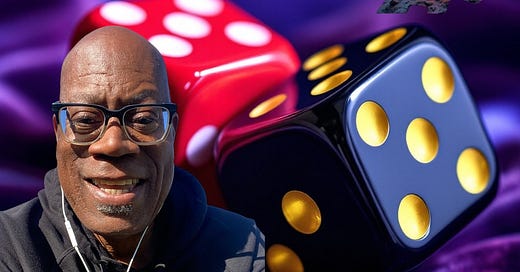There’s a peculiar thrill in surrendering to randomness, in allowing life to unfold without the burden of over planning. Some people fear uncertainty, but I’ve learned to embrace it—not as chaos, but as a cosmic collaborator. In my life, randomness has been an uninvited but generous guest, opening doors I never would have knocked on myself.
As author Brian Klass notes in his book Fluke: Chance, Chaos, and Why Everything We Do Matters:
“Whatever the reasons for why we tend to discount the total unity of our world and instead divide everything into neat boxes, interconnectedness is reality. It drives everything. Ours is an intertwined world. Once you accept that entangled existence, it becomes clear that chance, chaos, and arbitrary accidents play an outsize role in why things happen.”
For me, this philosophy finds its clearest expression in my relationship with the I Ching, an ancient Chinese divination text often referred to as the Book of Changes. Rooted in randomness, it operates through the casting of yarrow sticks or coins to generate one of 64 hexagrams, each representing a different state of flux in life.
Unlike the rigid cause-and-effect thinking we cling to in the West, the I Ching suggests that the unfolding of life is not linear but fluid—an ongoing dance with the unknown.
In this way, it shares an unexpected kinship with artificial intelligence. Both the I Ching and AI operate on patterns derived from randomness—one through ancient wisdom encoded in symbols, the other through vast datasets and probability matrices.
Just as an AI model can predict outcomes by processing seemingly unrelated inputs, the I Ching reveals meaning by distilling chaos into structured insight. Neither offers certainty, yet both illuminate possibilities.
One of the most delightful, serendipitous encounters of my life happened in Salt Lake City at Weller Book Works, a place where randomness and fate seem to linger between the bookshelves. I struck up a conversation with Tony Weller, the store’s charismatic owner, who, to my astonishment, pulled out a small set of dice from his pocket mid-conversation.
“For whenever I’m confronted with a question,” he said with a wry grin, rattling the dice in his palm. At that moment, it struck me—this man had made a practice of welcoming randomness, carrying around a tangible symbol of life’s unpredictability, rolling the dice whenever he needed a nudge from the universe.
It was a reminder that randomness isn’t something to be feared. It’s something to engage with, to converse with, to invite into our decisions—not as reckless abandon, but as a way to release the stranglehold of control.
I learned this firsthand in 1993, when a casual lunch conversation with a fellow instructor at a small business college in Chicago led to a pivotal moment in my career. She mentioned an upcoming event in need of a speaker. Despite having spoken only a few time professionally, I threw my name in, thinking, Why not?
Looking back, that single talk snowballed into a whirlwind of speaking engagements, and before I knew it, I was booked for over 85 events a year. One moment of spontaneous decision-making—a conversation I could have easily walked away from—set the trajectory for decades of work.
If there’s anything I’ve learned, it’s that randomness is a generous partner if you know how to dance with it. Here are five nuggets of wisdom for becoming a better co-creator with the unpredictable:
⭕️ Make Yourself Available to the Unplanned – Structure is important, but too much rigidity suffocates serendipity. Leave space in your schedule for the unexpected.
⭕️ Say Yes More Often Than No – Within reason, of course. Some of the most extraordinary moments in life come from agreeing to things you initially feel unqualified or unprepared for.
⭕️ Create Small Rituals for Randomness – Whether it’s flipping a coin, rolling dice like Tony Weller, or drawing a tarot card, inviting randomness into small decisions strengthens your ability to flow with bigger uncertainties.
⭕️ View Randomness as a Language, Not a Threat – The I Ching, AI algorithms, and even traffic patterns operate on principles of randomness. Instead of resisting uncertainty, ask what it’s trying to tell you.
⭕️ Embrace the Mystery, Not Just the Outcome – Sometimes, a so-called “wrong turn” leads to exactly where you need to be. Be less obsessed with predicting the future and more engaged with how it unfolds.
Randomness isn’t an accident. Rather I see it as an invitation. An invitation to loosen the grip on control, to trust the unfolding of things, to roll the dice not just in the face of uncertainty, but in celebration of it.
If the daily Chocolate Taoist nomadic wisdom lights up your day, fuels your mind, or gives you a fresh perspective, I’d love your support as a paid member!
Or, if you’re feeling generous, drop a little (or a lot) of dirty chai latte love my way—every bit helps keep this Taoist journey flowing.
I’m committed to delivering high-quality, thought-provoking features straight to your inbox—no paywalls, no fluff, just raw, unfiltered wisdom on what it means to be human in today’s paradoxical, mysterious, and uncertain world.
Your support fuels my full-time mission, and I appreciate every single contribution. Let’s keep this energy going!





how did he utilize the dice? was each number a different answer? Was it like a Magic 8 Ball?
Now I want a magic 8 ball...